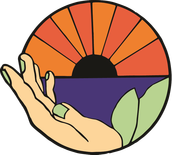Blog |
|
1/19/2023 0 Comments The Language of ReikiWhen I first began to practice Reiki and created a business with my practice, it became clear early on that I was going to have to find language around the art of Reiki. Language that not only invited curiosity and conversation around the subject of energy medicine, but was also authentic to me in a way that would convey my passion and belief in the healing process. I firmly believe as practitioners we not only enjoy the gifts of being in the healing community, but we also have a responsibility to share our knowledge with others who are interested.
At first, I found myself tripping over my words trying to explain something that I just fundamentally and deeply understood. I struggled to find the words to explain the practice of Reiki in a clear and concise manner that would inspire interest, and not sound too mysterious or obscure. William Rand, founder of the International Center for Reiki Training defines Reiki as A Japanese technique of deep relaxation and stress reduction that also promotes healing. This is a good definition, and it is certainly general, or even vague enough not to be off-putting to anyone. But it doesn’t really say anything – it doesn’t speak to the hands-on technique, or the facilitation of life-force energy, or the benefits of Reiki healing. However, it is a great initial introduction to Reiki and will prompt conversation with those who are seeking information on holistic medicine. Another, more succinct, definition of Reiki is simply “spiritually guided life-force energy.” Although also not especially broad in scope, this definition does narrow it down a bit. One of the reasons that we have trouble defining Reiki energy is because the English language has no word that explicitly means “life-force energy.” We are not a nature-based society and as such we have no cultural understanding of the subtle energies that surround us. Just because these energies are not detected by the human eye, does not mean they do not exist. In fact, we acknowledge and use transparent, or invisible, energies every day. Electricity is an example of a subtle energy that is not visible to the human eye, but we confirm its existence each time we flip on a light switch. The internet, radio waves, and gravity are all examples of high frequency energies that we make use of each day, but cannot see. Many cultures, both modern and ancient, have an acute awareness and understanding of the hidden energies that permeate our environment, the highest if which is life-force energy, the energy of love. In Japan the word for life-force energy is Ki. In China it is Chi, it is known as Prana in India, and in Hebrew Raush. Perhaps with more acceptance of natural, holistic practices our Western European culture will eventually create a word that captures the essence of Life-Force Energy. Another challenge with the language of Reiki is the translation from Japanese to English. Language mirrors the culture within which it is spoken. Japanese and American cultures are very different and there can be misunderstanding when trying to interpret the meaning of words and ideas. Usui’s five precepts, the principles (Gokai in Japanese) that will lead to happiness often vary in the wording depending upon the translation. Although the general meaning is the same, the words used to describe the precepts can be quite different. One thing is for sure – once embarking upon a Reiki adventure, one’s vocabulary will change and more thought provoking words, gentler words, words of compassion and curiosity become everyday words. We begin to think with words like gratitude and forgiveness, unconditional love and self-responsibility, intuition, and integrity. When we change our words, we can change our world.
0 Comments
Leave a Reply. |
AuthorWrite something about yourself. No need to be fancy, just an overview. Archives
May 2024
Categories |
Rising Sun Reiki Studio -
Excelsior, MN 55331
612.940.5851
Excelsior, MN 55331
612.940.5851

 RSS Feed
RSS Feed
